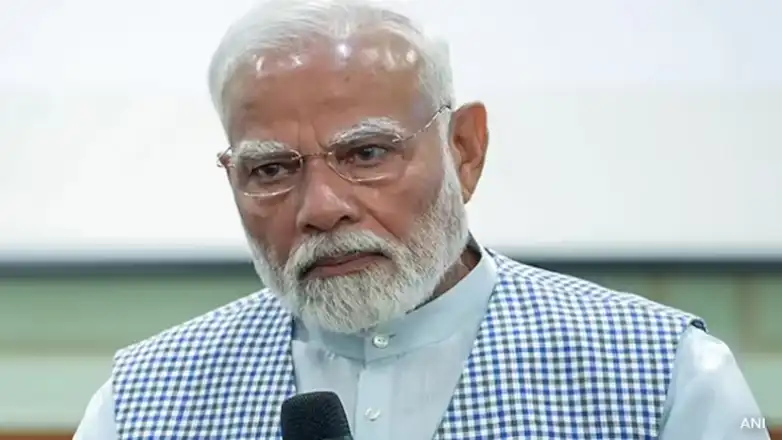“PM Modi’s 2011 Tweet on Tahawwur Rana Resurfaces After His Extradition to India”

Who Is Tahawwur Rana? His Role in the 26/11 Mumbai Attacksna
A tweet by Prime Minister Narendra Modi from 2011 has resurfaced online after India extradited Tahawwur Rana. The Pakistani-origin terror suspect was sent from the United States to India for his alleged role in the 2008 Mumbai attacks. Modi’s decade-old tweet is making rounds on social media, reigniting discussions on national security and long-standing demands for justice.
Rana is believed to have helped Pakistani-American terrorist David Headley scout locations in Mumbai. These efforts played a role in one of the deadliest terror attacks on Indian soil. The return of Rana to India after years of effort has brought attention back to Modi’s early warnings about the suspect.
U.S.-India Cooperation on Extraditing Terror Accused
In 2011, Narendra Modi was Gujarat’s Chief Minister. He tweeted:
“David Headley’s associate Tahawwur Rana is in U.S. custody. India must demand his extradition to face trial here. Terror must be crushed with an iron fist!”
Social media users have widely shared the post after Rana landed in India. Many praised Modi for taking a consistent stand against terrorism. BJP supporters called it proof of his foresight and dedication to national security.
The tweet appeared at a time when many Indians were frustrated with the slow progress in bringing 26/11 suspects to justice.
What Rana’s Extradition Means for India’s Anti-Terror Efforts
Tahawwur Hussain Rana is a Pakistani-origin Canadian businessman. He ran an immigration service in Chicago. Authorities arrested him in the U.S. in connection with terror activities. He is a close friend of David Headley, the main conspirator of the 2008 Mumbai attacks.
Headley confessed that Rana helped him plan the operation. Rana allegedly allowed him to pose as a business associate to gather intelligence for the attack.
In 2011, a U.S. court found Rana guilty of helping the Pakistani terror group Lashkar-e-Taiba. However, the court did not convict him for direct involvement in the 26/11 case. India later filed a fresh case and requested his extradition based on new charges.
Why Rana’s Extradition Matters
India pushed for Rana’s extradition for years. His arrival in India marks a key moment in the 26/11 investigation. Agencies believe that Rana has crucial information that could expose more people involved in the attack.
The National Investigation Agency (NIA) has already prepared detailed charges against him. His questioning may reveal new facts about the planning, funding, and execution of the attack.
Officials believe that this development could also put more pressure on Pakistan to act against terror groups operating from its territory.
What Is the Public Saying?
Social media erupted with reactions to Rana’s extradition. Many users highlighted Modi’s old tweet, calling him a leader who takes firm action. Hashtags such as #TahawwurRana, #PMModi, and #JusticeFor2611 began trending on Twitter.
Some users even compared the current government’s efforts with the earlier UPA regime. They argued that Modi has delivered what he promised even before becoming Prime Minister.
Opposition leaders, however, asked the government to ensure a transparent trial. They also criticized the long delay in bringing Rana back, stating that justice should not be delayed any further.
What Happens Next?
Authorities have moved Rana to a high-security location in Delhi. He will be presented before a special NIA court. The court will hear charges related to terrorism, criminal conspiracy, and helping plan attacks against India.
Legal experts say that the case will involve evidence from several countries. They expect a high-profile trial with international attention. If convicted, Rana could face life in prison or even the death penalty under Indian law.
The Indian legal system will now play a key role in delivering justice. This trial will also show how well India handles complex international terrorism cases.
Remembering the 26/11 Mumbai Attacks
The 2008 Mumbai attacks left a deep scar on India. Ten terrorists entered the city by sea and targeted key locations. These included the Taj Mahal Palace Hotel, Chhatrapati Shivaji Terminus (CST), and Nariman House. The attacks lasted for four days and killed 166 people.
David Headley admitted to conducting reconnaissance missions in Mumbai. He shared the intelligence with Lashkar-e-Taiba, which later carried out the attacks. Rana allegedly supported Headley throughout these missions.
The only attacker caught alive, Ajmal Kasab, was later hanged in India. The rest were killed during the operation. Despite the action taken, many Indians felt justice was incomplete as several masterminds remained free.
India’s Fight Against Terror Continues
India has worked hard to build global support for its fight against terrorism. It has called out countries that support or shelter terrorists. The government has also taken steps to freeze the assets of terror groups and arrest their leaders.
India partnered with nations like the U.S., France, and the U.K. to improve counter-terrorism strategies. It has also pushed the United Nations to place individuals like Hafiz Saeed and Masood Azhar on its sanctions list or designated terrorist list.
The extradition of Tahawwur Rana strengthens India’s position. It also shows that the country is serious about pursuing justice, no matter how long it takes.
You can read more about India’s anti-terror efforts on the official Ministry of External A
Final Thoughts
PM Modi’s 2011 tweet about Tahawwur Rana reflects his early commitment to fighting terrorism. After more than a decade, India has finally brought Rana home to face justice. His trial will be watched not just in India, but around the world.
This case sends a strong message: even if justice takes time, it must be pursued without giving up. The nation hopes that this step will bring closure to the victims and their families, and help prevent future tragedies like 26/11.






